Bottle Shock
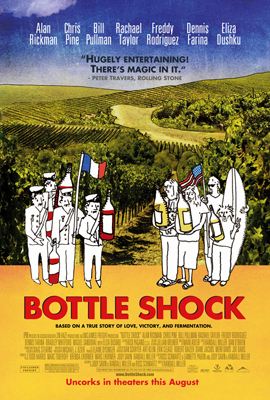
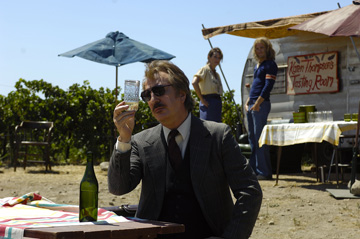 The film is loosely based on the true story of how back in 1976, a blind taste test was performed, where the best wines of California and Paris were put up against either other by a panel of judges and wine experts. California won the competition, and brought world-wide attention to the industry. This in itself is interesting, but before we get to that, we have to go through a very slow and plodding story about how a British wine shop owner in Paris named Steven Spurrier (Alan Rickman) travels to California to experience firsthand that state's wine production. His ultimate goal is to pick the best US wines to place in the upcoming competition. One of the vineyards he stops at is Chateau Montelena, which is run by the struggling Jim Barrett (Bill Pullman) and his adult son Bo (Chris Pine). Jim does not exactly hit things off with the somewhat uptight and proper Steven, and thinks that the competition he speaks of is just a way for the French to humiliate the US in public. But Bo thinks they have a chance, and along with recently hired intern Sam (Rachael Taylor) and good friend and co-worker Gustavo (Freddy Rodriguez), enters his father's wine in the competition.
The film is loosely based on the true story of how back in 1976, a blind taste test was performed, where the best wines of California and Paris were put up against either other by a panel of judges and wine experts. California won the competition, and brought world-wide attention to the industry. This in itself is interesting, but before we get to that, we have to go through a very slow and plodding story about how a British wine shop owner in Paris named Steven Spurrier (Alan Rickman) travels to California to experience firsthand that state's wine production. His ultimate goal is to pick the best US wines to place in the upcoming competition. One of the vineyards he stops at is Chateau Montelena, which is run by the struggling Jim Barrett (Bill Pullman) and his adult son Bo (Chris Pine). Jim does not exactly hit things off with the somewhat uptight and proper Steven, and thinks that the competition he speaks of is just a way for the French to humiliate the US in public. But Bo thinks they have a chance, and along with recently hired intern Sam (Rachael Taylor) and good friend and co-worker Gustavo (Freddy Rodriguez), enters his father's wine in the competition.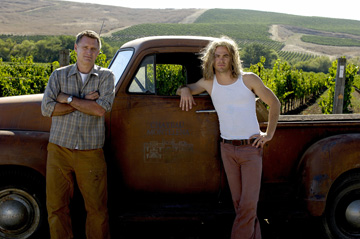 The problem with Bottle Shock is that it never truly knows how to hold our attention, nor does it know how to bring these characters together. Alan Rickman as Steven Spurrier may as well be starring in his own separate movie, since he has surprisingly little interaction with anyone else except for his shop's sole customer (Dennis Farina), and spends most of his time doing his own thing. The film moves literally at a glacial pace and despite some time-tested themes as father-son rivalries and love triangles, never manages to spark even the most remote interest. That's because these subplots are hastily thrown in, and not nearly developed enough. The rivalry between Jim and his son Bo has a lot to do with the fact that they don't see eye-to-eye on anything. They're at each other's throats so often, they even have a crude boxing ring constructed on their property so that the two can throw punches at each other. The relationship never quite works, because Bill Pullman and Chris Pine never seem fully behind their characters. They act more like total strangers to each other, rather than a father and son who have had differences all their lives, but still respect one another. The basis of their relationship and why they stick together despite it all never comes through, making their scenes come across as awkward and forced.
The problem with Bottle Shock is that it never truly knows how to hold our attention, nor does it know how to bring these characters together. Alan Rickman as Steven Spurrier may as well be starring in his own separate movie, since he has surprisingly little interaction with anyone else except for his shop's sole customer (Dennis Farina), and spends most of his time doing his own thing. The film moves literally at a glacial pace and despite some time-tested themes as father-son rivalries and love triangles, never manages to spark even the most remote interest. That's because these subplots are hastily thrown in, and not nearly developed enough. The rivalry between Jim and his son Bo has a lot to do with the fact that they don't see eye-to-eye on anything. They're at each other's throats so often, they even have a crude boxing ring constructed on their property so that the two can throw punches at each other. The relationship never quite works, because Bill Pullman and Chris Pine never seem fully behind their characters. They act more like total strangers to each other, rather than a father and son who have had differences all their lives, but still respect one another. The basis of their relationship and why they stick together despite it all never comes through, making their scenes come across as awkward and forced.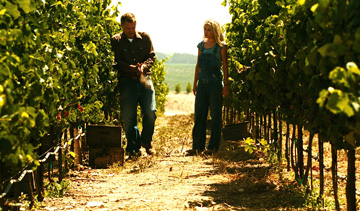 The other main subplots, both of them concerning Bo's two friends at the vineyard, manage to come across even worse, surprisingly. One of them concerns Bo's budding relationship with the lovely Sam, and how she also builds feelings for Gustavo to the point that she sleeps with him. This would be a major detail in another movie, but here, it's simply glossed over haphazardly. The fact that Sam and Gustavo spent the night together is hardly brought up or even mentioned again after it happens, and the relationships of the three characters never seems that strained afterward, almost as if it never happened. Same goes for another subplot concerning Gustavo, where it's discovered early on that he's making his own wine secretly without Jim or Bo knowing about it. It's established, but it never really goes anywhere, nor does it have anything to do with the rest of the movie after that. The movie could have easily followed and made something out of the tension these ideas naturally create, but it chooses to ignore this fact, and keep on showing a lot of aerial overhead shots of vineyards and close ups of workers picking grapes.
The other main subplots, both of them concerning Bo's two friends at the vineyard, manage to come across even worse, surprisingly. One of them concerns Bo's budding relationship with the lovely Sam, and how she also builds feelings for Gustavo to the point that she sleeps with him. This would be a major detail in another movie, but here, it's simply glossed over haphazardly. The fact that Sam and Gustavo spent the night together is hardly brought up or even mentioned again after it happens, and the relationships of the three characters never seems that strained afterward, almost as if it never happened. Same goes for another subplot concerning Gustavo, where it's discovered early on that he's making his own wine secretly without Jim or Bo knowing about it. It's established, but it never really goes anywhere, nor does it have anything to do with the rest of the movie after that. The movie could have easily followed and made something out of the tension these ideas naturally create, but it chooses to ignore this fact, and keep on showing a lot of aerial overhead shots of vineyards and close ups of workers picking grapes.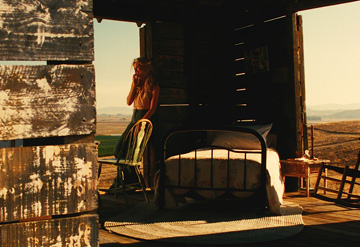 There's absolutely nothing that stands out about Bottle Shock, not even the fact that it was filmed in California's wine country. You'd think that alone would at least give the film a sort of visual splendor, but the cinematography is just as dull and lifeless as everything else in this movie. The performances also fail to rise above the material, despite the fine cast assembled. I didn't think it was possible, but apparently you can put Alan Rickman in your movie, and make him boring to watch. For that, the filmmakers deserve some kind of perverse praise for their achievement. To be fair, Rachael Taylor has a warm screen presence as Sam, but the movie doesn't do enough to exploit that fact, opting instead to focus on the less interesting characters around her. Eliza Dushku also has a small role as a bartender, and in her very brief scenes, manages to give her character more intelligence than just about anyone else in the movie.
There's absolutely nothing that stands out about Bottle Shock, not even the fact that it was filmed in California's wine country. You'd think that alone would at least give the film a sort of visual splendor, but the cinematography is just as dull and lifeless as everything else in this movie. The performances also fail to rise above the material, despite the fine cast assembled. I didn't think it was possible, but apparently you can put Alan Rickman in your movie, and make him boring to watch. For that, the filmmakers deserve some kind of perverse praise for their achievement. To be fair, Rachael Taylor has a warm screen presence as Sam, but the movie doesn't do enough to exploit that fact, opting instead to focus on the less interesting characters around her. Eliza Dushku also has a small role as a bartender, and in her very brief scenes, manages to give her character more intelligence than just about anyone else in the movie.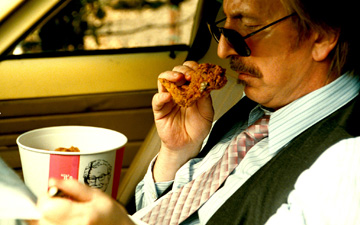
See the movie times in your area or buy the DVD at Amazon.com!






0 Comments:
Post a Comment
<< Home